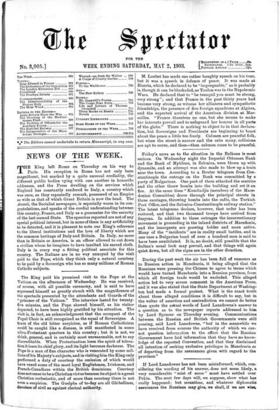The King paid his promised visit to the Pope at
the Vatican on the afternoon of Wednesday. He was received, of course, with all possible ceremony, and is said to have expressed himself as greatly struck with the magnificence of the spectacle presented by the attendants and Guards of the "prisoner of the Vatican." The interview lasted for twenty- five minutes, and the Pope showed himself, as his visitor departed, to have been highly gratified by his attention. The visit is, in fact, an acknowledgment that the occupant of the Papal Chair is still recognised as the equal of Sovereigns. A trace of the old bitter suspicion, as if Roman Catholicism could be caught like a disease, is still manifested in some ultra-Protestant quarters in this country ; but it is not, we think, general, and is certainly most unreasonable, not to say discreditable, When Protestantism loses the spirit of tolera- tion it loses its chief glory, and its light becomes darkness. The Pope is a man of fine character who is venerated by some mil- lions of his Majesty's subjects, and in visiting him the King only performed a duty of courtesy the omission of which would have vexed some of the most loyal Englishmen, Irishmen, and French-Canadians within the British dominions. Courtesy does not cease to be a Christian virtue because its object is a great Christian ecclesiastic, and of more than courtesy there is not even a suspicion. The Guelphs of to-day are all Ghibellines, I devotees of civil as against clerical authority. M. Loubet has made one rather haughty speech on his tour, but it was a speech in defence of peace. It was made at Bizerta, which be declared to be "impregnable," as it probably is, though it can be blockaded, as Toulon was in the Napoleonic Wars. He declared that to "be tranquil you must be strong, very strong"; and that France in the past thirty years had become very strong, as witness her alliances and sympathetic friendships, the presence of five foreign squadrons at Algiers, and the expected arrival of the American division at Mar- seilles. " France threatens no one, but she means to make her interests prevail and to safeguard her honour in all parts of the globe." There is nothing to object to in that declara- tion, but Sovereigns and Presidents are beginning to boast about the peace a little too freely. Cabmen are peaceful folk, but when the street is narrow and the cabs many, collisions are apt to occur, and then—then cabmen cease to be peaceful.










































